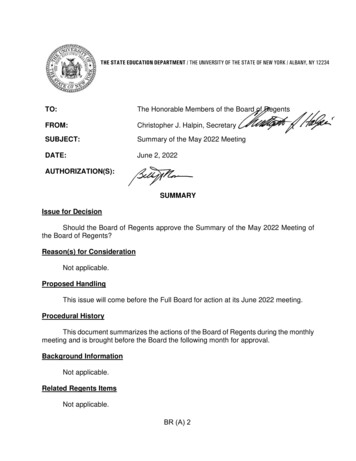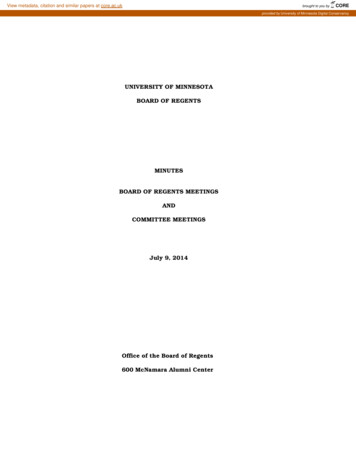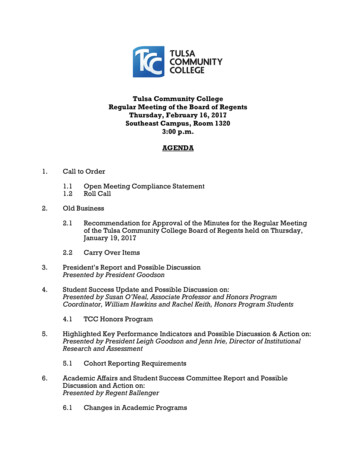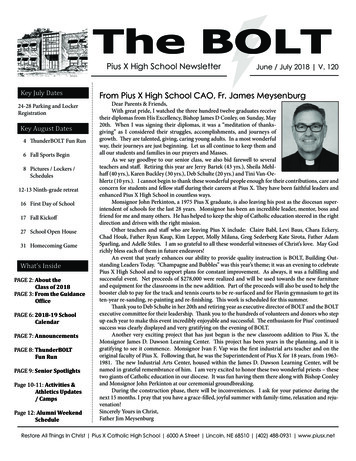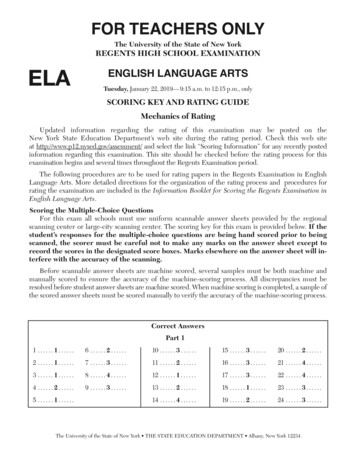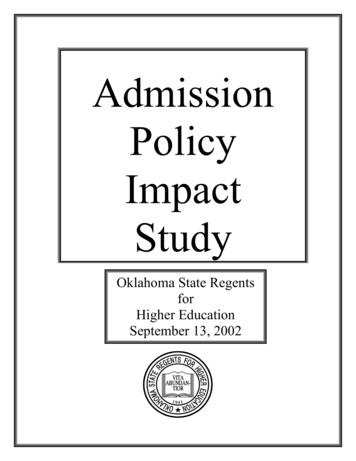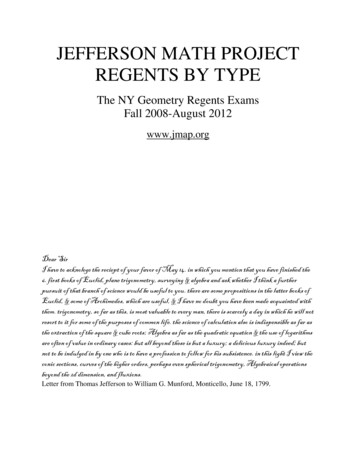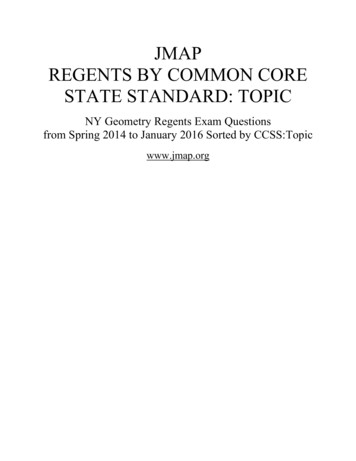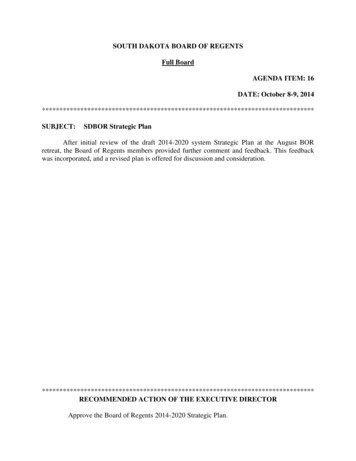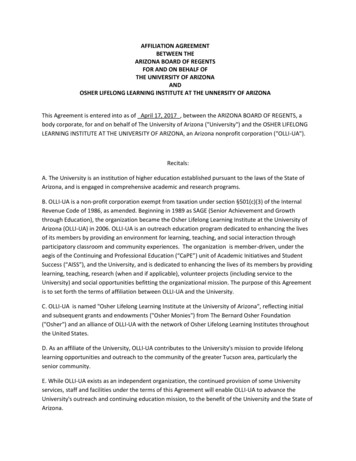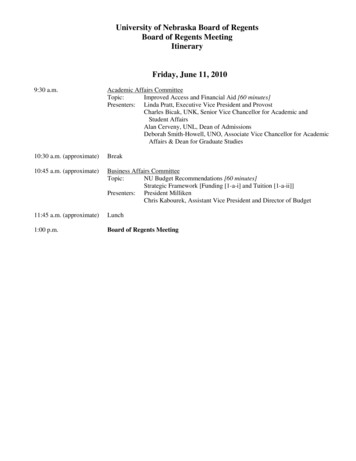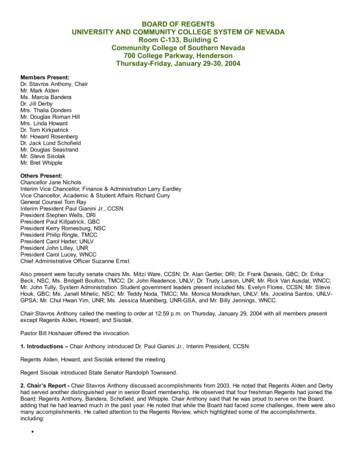
Transcription
BOARD OF REGENTSUNIVERSITY AND COMMUNITY COLLEGE SYSTEM OF NEVADARoom C 133, Building CCommunity College of Southern Nevada700 College Parkway, HendersonThursday Friday, January 29 30, 2004Members Present:Dr. Stavros Anthony, ChairMr. Mark AldenMs. Marcia BanderaDr. Jill DerbyMrs. Thalia DonderoMr. Douglas Roman HillMrs. Linda HowardDr. Tom KirkpatrickMr. Howard RosenbergDr. Jack Lund SchofieldMr. Douglas SeastrandMr. Steve SisolakMr. Bret WhippleOthers Present:Chancellor Jane NicholsInterim Vice Chancellor, Finance & Administration Larry EardleyVice Chancellor, Academic & Student Affairs Richard CurryGeneral Counsel Tom RayInterim President Paul Gianini Jr., CCSNPresident Stephen Wells, DRIPresident Paul Killpatrick, GBCPresident Kerry Romesburg, NSCPresident Philip Ringle, TMCCPresident Carol Harter, UNLVPresident John Lilley, UNRPresident Carol Lucey, WNCCChief Administrative Officer Suzanne ErnstAlso present were faculty senate chairs Ms. Mitzi Ware, CCSN; Dr. Alan Gertler, DRI; Dr. Frank Daniels, GBC; Dr. ErikaBeck, NSC; Ms. Bridgett Boulton, TMCC; Dr. John Readence, UNLV; Dr. Trudy Larson, UNR; Mr. Rick Van Ausdal, WNCC;Mr. John Tully, System Administration. Student government leaders present included Ms. Evelyn Flores, CCSN; Mr. SteveHouk, GBC; Ms. Janell Mihelic, NSC; Mr. Teddy Noda, TMCC; Ms. Monica Moradkhan, UNLV; Ms. Jocelina Santos, UNLV GPSA; Mr. Chul Hwan Yim, UNR; Ms. Jessica Muehlberg, UNR GSA, and Mr. Billy Jennings, WNCC.Chair Stavros Anthony called the meeting to order at 12:59 p.m. on Thursday, January 29, 2004 with all members presentexcept Regents Alden, Howard, and Sisolak.Pastor Bill Hoshauer offered the invocation.1. Introductions – Chair Anthony introduced Dr. Paul Gianini Jr., Interim President, CCSN.Regents Alden, Howard, and Sisolak entered the meeting.Regent Sisolak introduced State Senator Randolph Townsend.2. Chair’s Report Chair Stavros Anthony discussed accomplishments from 2003. He noted that Regents Alden and Derbyhad served another distinguished year in senior Board membership. He observed that four freshman Regents had joined theBoard: Regents Anthony, Bandera, Schofield, and Whipple. Chair Anthony said that he was proud to serve on the Board,adding that he had learned much in the past year. He noted that while the Board had faced some challenges, there were alsomany accomplishments. He called attention to the Regents Review, which highlighted some of the accomplishments,including:
Benefits for those serving our country and the family of those killed in action The Board extended its policy forawarding scholarships and fee waivers to surviving family members of those killed in the line of duty while serving ourcountry. Awards were issued for those who lost their lives in Afghanistan and Iraq.Fee waivers for Nevada National Guardsmen were granted in recognition of the sacrifices made as citizen soldiers.Aid to professional staff called to duty – UCCSN covered differences between military and UCCSN pay for thoseprofessional staff called to duty in the past year.Improved the work environment – The Board:Strengthened the nepotism policy by creating uniformity among the campuses.Passed a strict, standardized sexual harassment policy.Provided health insurance for graduate assistants.New facilities included:Frank H. Rogers Science & Technology Building – DRI.Jack C. Davis Observatory – WNCC.Nell J. Redfield Foundation Performing Arts Center – TMCC.Lights installed at Mackay Stadium – UNR.Working on a Science, Engineering & Technology building – UNLV.Groundbreaking for Morse Arberry Jr Telecommunications Building CCSN.Increased student access – The Board approved the creation of a web based Academic Program Information System,enabling students to use the power of the internet to find critical information about programs on every campus.K 12 poster 133,000 posters printed in English and Spanish were distributed in an effort to get more information tomiddle and high school students regarding the importance of higher education.Common course numbering – A Board established committee has been working to create a uniform numberingsystem throughout UCCSN for all baccalaureate degree courses.Chair Anthony completed his report by stating that he was confident the Board would enjoy a productive 2004.3. Presidents’ Reports Each UCCSN president presented a progress report on their institution’s activities over the pastyear to meet the targets for Master Plan goal one, A Prosperous Economy, and their plans for continuing to meet this goal inthe next year (Ref. A on file in the Board office).President Paul Killpatrick, GBC – President Killpatrick reported that GBC serves its region in responding to workforce needsby preparing teachers, providing training for the mining industry, responding to the community’s health related needs, andproviding regionally bound students with the opportunity to pursue baccalaureate degrees. Delivery of distance educationprovides rural students wishing to remain in their community the opportunity to pursue a baccalaureate degree. The collegehas established successful partnerships with local businesses in rural Nevada to provide specialized training to thoseimpacted by the changing economic conditions. GBC is actively involved with community groups such as the Elko CountyEconomic Diversification Authority, Job Opportunities in Nevada, Elko Chamber of Commerce, Elko Convention and VisitorsAuthority, and Nevada Job Link to promote the economic retention of current businesses and increase economicdiversification in rural communities. In partnership with the region’s economic development authorities, the Small BusinessDevelopment Centers, and the chambers of commerce, GBC is conducting a study to determine the feasibility ofestablishing business incubator programs in Elko, Ely, and Winnemucca. GBC’s Manpower Training Cooperative, Inc.initially started from an earlier partnership the college had with Newmont Mining Company. It provided evidence that miningcompanies and mining support businesses could benefit from workforce training programs. The program has expanded andcurrently offers accelerated one year associate of applied science degree programs in Diesel Technology,Electrical/Instrumentation Technology, and Welding Technology. The MTC program has trained over 1,000 people andapproximately 85% entered the workforce within three months of graduation. The college has also expanded its programs tohigh schools in the service area through articulation agreements.Interim President Paul Gianini Jr., CCSN – President Gianini reported that CCSN is helping achieve this goal through:
(1) educational programs that focus on state needs and critical shortages;(2) increasing community partnerships and collaborations; and(3) enhancing workforce development in sectors with high growth potential.The community college’s role in supporting economic development involves building qualified work forces, so new and“clean” industries will want to relocate to Nevada bringing high wage and high skill jobs, as well as helping to expand thoseindustries already here. Dr. Gianini felt it was the college’s responsibility to recognize that their student body is changing,with older and more sophisticated students demanding traditional courses and programs at non traditional times. Collegesneed a broad approach to economic development by utilizing every delivery system available (credit, continuing education,seminars, and conferences). Students attend to prepare for a job or update their skills to keep a job that will help themsupport themselves financially, which will enhance their well being and ability to lead a higher quality of life, which willsupport the economic development of their communities. He said the college needs to define the support of economicdevelopment not just as a process of serving the business community through continuing education courses, but as aresponsibility of the entire college to help students obtain their desired results by filling in the gaps between what they wantand what the college can provide, and customizing those offerings to the clients’ needs. CCSN is well on its way to meetingthe Nevada legislature’s and Board’s mandate to double the enrollment of nursing candidates to overcome the state’sshortage of medical caregivers. CCSN’s Engineering Technology Program, skilled workforce training and the cutting edgetelecommunications facility under construction helped the Nevada Development Authority attract Genesi USA. Otherengineering technology partnerships have been developed with Sprint, the Federal Aviation Administration, Bechtel Nevada,Nellis Air Force Base, Red Rock Communications, Nevada Power, the Las Vegas Valley Water District, and the City of NorthLas Vegas. Cisco Systems, International Gaming Technology, and Bally Gaming have donated funds or equipment to thecollege. This Spring, CCSN embarks on a dual joint initiative with Nevada State College and UNLV offering creative 2 2programs designed to increase the number of trained new teachers for southern Nevada elementary schools. In the past twoyears, CCSN’s automotive programs have grown 54% to 800 students. General Motors alone donated 200,000 in vehiclesand equipment to the program last year. Corporate partnerships include GM, Ford, and AC Delco programs, Toyota, andChrysler. Local partnerships include Derek Daly racing academy, Ted Wiens Tire and Auto, and Pep Boys. CCSN’s ACTCenter provides testing for licensure or certification before employment in skilled fields such as social workers, dietitians,and nuclear medicine, with 1,000 people receiving testing since last July. The Center also provides training and testing forEthel M Chocolates, Bombardier Transportation, and Nevada Power’s Reid and Clark stations. As part of CCSN’s continuingeducation division, the Institute for Business and Industry contracts with employers for services provided through itsCorporate and Customized Training, Business Resource Center, Center for Professional Advancement and Development,Computer and Technology Center, Manufacturing Assistance Partnership, and Language Center. Nearly 10,000 people weretrained in 2003. During the past six months, CCSN delivered 129 programs on site to Sierra Health Services and registered1,650 participants. Nevada State Bank just completed a series of management classes at CCSN and the City of Hendersonhas expanded IBI offerings to city employees. Train Employees Now (TEN) is a state economic development program thatsubsidizes start up training costs as an incentive for companies relocating or expanding in Nevada. IBI works with theNevada Commission on Economic Development to provide training to new or expanding companies. IBI contracts with all buttwo area hospitals to provide advance emergency medicine classes for attending and staff physicians and nurses. Dr.Gianini concluded his report by stating that CCSN is in a solid partnership with business to develop and sustain a strong,dynamic, knowledge based economy for Nevada.President Kerry Romesburg, NSC – President Romesburg reported that two areas of critical need in Nevada are nursing andteacher education. These two programs are the cornerstones of the Nevada State College curriculum. The college currentlyhas 82 nursing majors, over 200 students in pre nursing, and over 150 students in teacher education and pre teachereducation. In partnership with WNCC and CCSN, NSC offers a 2 2 program in teacher education on the Fallon andCharleston campuses respectively.NSC is also partnering with TMCC and the Reno Police Department in offering a four year public administration degree withemphasis in law enforcement in Reno, and partnering with CCSN to offer a similar program in Pahrump. The collegecontinues to develop programs in visual media and computing, business, and applied technology. Recruitment efforts havebeen wide ranging, but a concerted effort is being made to recruit and assist students from underserved areas andpopulations.Regent Howard asked whether NSC’s students were from the Las Vegas area and whether distance education/onlinecourses were also offered. President Romesburg replied that NSC offered some distance education, as well as some onlinecourses. He reported that the majority of NSC’s enrollment was from the Las Vegas valley, adding that 60% of theenrollments came from outside of Henderson. Less than 5% of the enrollments were in distance education. Regent Howardasked whether he planned to partner with the other institutions using distance education or whether he planned to recruit fromthose areas. President Romesburg replied that NSC would have an onsite presence in partnering with the institutions andwould contract with their faculty to teach NSC’s curriculum. NSC will not be sending its faculty around the state. RegentHoward asked whether NSC offered classes on other institution campuses. President Romesburg replied that they did.Regent Howard said that she did not recall that item coming before the Board for approval. She asked whether it had beenhandled by the ARSA Committee. President Romesburg replied that it had been. He said that a formal written agreement had
not yet been established. Regent Howard said that she supported 2 2 programs, adding that she had an issue with thisbecause she recalled former President Moore had tried to do the same thing and met with opposition. She said she did notknow whether it was appropriate to be offering NSC courses on other institution’s campuses. She asked whether any otherinstitutions did this. Chair Anthony said the conversation was off track. He offered to provide information to Regent Howardabout the decisions that have been made, adding that it could be discussed at another time. Regent Howard said that shewanted an answer to her question. President Romesburg replied that UNLV has a similar arrangement with CCSN’sCheyenne campus, while NSC offers courses on the Charleston campus.President Stephen Wells, DRI – President Wells reported that the research institutions contribute to Nevada’s economy in avariety of ways. DRI directly contributes to Nevada’s dynamic economy through a variety of effective strategies including (1)growth in research activity, (2) implementation of programs that save money as well as protect and preserve resources, and(3) development of new technologies. DRI research attracted more than 28 million to Nevada in FY03, with more than 90%of this revenue coming from federal and commercial sponsors outside the state. Using the standard 2.4 economic multiplier,this translates to an economic impact on Nevada’s economy of nearly 68 million for FY03. These funds directly benefitproduction, employment, and income in the state. The FY03 annual total represents an increase of 8.3 million (41%) sinceFY99. Dr. John Watson, an air quality scientist who joined DRI in 1982, has contributed more than 40 million in researchgrants and contracts to Nevada. He leads the Southern Nevada Air Quality Study, which is helping to meet air qualitystandards and ensure continued federal funding of highways in southern Nevada. Since the creation of DRI’s integratedscience centers (CALEM and CWES in 1999 and CERM in 2003), the centers have generated more than 12 million inresearch awards and obligated funding. DRI’s weather modification program continues to enhance water supplies in mountainranges throughout the state. Nevada’s program focuses on winter cloud seeding and yielded an estimated 86,400 acre feetof water in mountain snowpacks last year. An acre foot provides a year’s worth of water for a family of four. Lake Tahoetourism is a major industry with more than two million visitors each year and an estimated economic impact of more than 1.6 billion (1997). DRI has developed a novel precipitation gauge in collaboration with the University Corporation forAtmospheric Research in Colorado that has now been licensed for manufacture. The unique rain gauge will be used alongairport runways and busy highways to track weather conditions and help ensure the safety of travelers. UNR and DRIestablished a new Technology Transfer Office to meet the technology transfer needs of both institutions.4. Public Comment – Chair Anthony said that public comment would also be taken separately for the residency issue.UNR student senator, Mr. Travis Hoppe, reported on the Student Evaluations Act, which seeks to make official student teacher evaluations public record with the intent of increasing public awareness about the quality of education provided. Mr.Hoppe related that some quality educators never receive proper recognition for their teaching achievements, while otherteachers are ineffective. He said the evaluations reveal legitimate student concerns and felt that students and instructorswould both benefit from making the records public. He said the Act required no monetary obligation. Provisions allow theinstitutions to charge a fee for providing such copies.Regent Sisolak asked whether Mr. Hoppe had discussed this with the faculty senate. Dr. Trudy Larson, Faculty SenateChair UNR, replied that the faculty was very proud of the entrepreneurial spirit expressed, but disagreed with having theirpersonnel records released to students. She said that faculty encouraged retaining student input regarding teachers, but theydesire a system not involving the publicizing of faculty personnel records.Regent Derby said that feedback was very valuable for teachers. She questioned Dr. Larson’s comment about the personnelrecords. Mr. Hoppe explained that student teacher evaluations were currently filed in the instructors’ personnel files. Mr.Hoppe explained that a proposed change to the Handbook could address that issue.Regent Hill asked whether other institutions followed this practice and how it was handled. He also asked how legal issuesregarding personnel matters at other institutions were handled. He said that faculty, students and the Board should considerproviding the information in an official manner rather than having students doing it unofficially. Chair Anthony said the issuewould be included on a future ARSA agenda.Regent Rosenberg reported there are a number of websites available for rating professors, adding that it was a humblingexperience to read student evaluations. He agreed with making the evaluations public if they could be separated from thepersonnel records.UNLV student, Ms. Ruby Watson, reported that she plans to graduate in December. A non traditional student, Ms. Watsonreturned to college following a 20 year absence with a 3.275 GPA from southern California. In her second semester, she wasinvolved in two automobile accidents. As a result, she was unable to complete some of her classes. She said that she hadnot been informed that UNLV allows students only 6 months to complete an incomplete grade. She was under the mistakenimpression that she had one year in which to complete an incomplete grade. Her requests to withdraw were denied, whichnegatively impacted her GPA, which dropped below the minimum level required to graduate. Upon pleading her case at theProvost’s office, two of her incomplete grades were changed to F’s, further negatively impacting her GPA. Ms. Watson saidthat she had intended to attend law school, but is now unable to enter because her GPA is too low. She asked the Board toplease review her case. She reported that her daughter’s incomplete grades were forgiven at CCSN.
Regent Alden said the Board should assist Ms. Watson, adding that he felt she would make a great lawyer.Regent Howard recalled Ms. Watson’s previous appearance before the Board regarding this situation and asked PresidentHarter for an explanation. President Harter replied that this case underwent an extremely vigorous and lengthy review.General Counsel Ray said that a student’s grades/records could not be discussed in public, adding that he was veryconcerned about violating FERPA requirements. Regent Howard noted a point of order, stating that so long as Ms. Watsonwas present and felt comfortable discussing her own grades, Regent Howard felt that was all that was important. RegentHoward observed that Ms. Watson had made her grades public. Regent Howard said that she would appreciate permission todiscuss this matter. Ms. Watson stated that she did not object. Regent Howard said that she did not want to stonewall thisissue. She asked what problem there was when Ms. Watson was present to discuss her own records. General Counsel Raysaid that Ms. Watson had the right to discuss her own records, noting that the Board could not control what was discussedduring public comment. He emphasized that it was important to understand what the Board can or cannot do. He said hewould prefer to have a signed, written waiver prior to any discussion. He said that if Ms. Watson wished to state on therecord that she understood her rights pursuant to FERPA and that she was willing to waive those rights, he would accept it.Regent Howard asked Ms. Watson to put a statement in writing. Ms. Watson agreed to do so.President Harter replied that Ms. Watson’s case underwent an extremely vigorous review, involving UNLV’s Faculty SenateAcademic Standards Committee. She said the committee and the Associate Provost reviewed the matter at length. Sherelated that UNLV administration would not override a decision from this committee.Chair Anthony asked whether Ms. Watson’s appeal had included consideration of a more recent set of (better) grades. Ms.Watson replied the faculty senate had only considered one grade (an “F”). After receiving the committee’s decision, Ms.Watson was told to speak with the Provost’s office. Dr. Cloud, Associate Provost, Academic Affairs UNLV, changed anincomplete grade to an “F” and entered what Ms. Watson felt was a false statement as to the entry date into the Registrar’srecord. Ms. Watson reported that she made the dean’s list following this incident, but the two “F’s” were preventing her fromapplying to law school. Regent Howard asked whether Ms. Watson had shared her medical records with UNLV. Ms. Watsonreplied that she had not, but her lawyer sent a letter asking UNLV to reverse the “F” given by Dr. Cloud. Chair Anthony askedwhether another appeal could be considered. President Harter agreed one could be done following a thorough review. Shenoted there were two separate issues; Ms. Watson’s current status as a student and her admission into the Boyd School ofLaw. President Harter related that Ms. Watson has the right to apply, adding that she would be valued with all of the studentswho apply. She related that many factors were considered in addition to GPA. Regent Howard said that Ms. Watsonunderstood that the law school process was different. She was disturbed about the Provost’s office changing a grade froman incomplete to an “F”. President Harter said she would like to get the facts first. Chair Anthony suggested going throughthe appeal process and an investigation. Regent Howard felt there should be an investigation regarding what really happened.President Harter assured Regent Howard it would be done. Regent Howard said an investigation was necessary to discoverwhether this happened. She said this was not the first incidence she had heard about. She said that someone should be heldaccountable if Ms. Watson was provided misinformation about the time she had to make up a grade. She asked Ms. Watsonthe name of the individual who provided the information about having one year. Ms. Watson replied that the manual statesthat students are required to complete the grade by the following semester (6 months). She claimed that some teachersallow students one year. She acknowledged that she also had been given one year to make up a grade, after a fight. RegentHoward said that exceptions were permitted for medical conditions. She asked whether Ms. Watson’s medical recordsindicated a medical condition. Ms. Watson replied that she had medical records dating back to 1989, adding that she wasalso legally disabled. Regent Howard asked who handled Ms. Watson’s case. Ms. Watson said she initially went to thefaculty senate, but could not recall the woman’s name. She was referred by Dr. Rasmussen (psychology department). Ms.Watson’s appeal was denied within two days. Regent Howard said that she was glad Ms. Watson had an opportunity toexpress her concerns during Public Comment and thanked Ms. Watson for coming forward. Ms. Watson said the lawschool’s criteria required a 3.0 GPA in order to apply.Chair Anthony encouraged President Harter to initiate a review process as expeditiously as possible and to provide a copy ofthe resolution to the Board.5. Approved Consent Agenda – The Board approved the Consent Agenda with the exception of #1 (Minutes), #4 (ScienceBuilding Build Out, CCSN), #7 (Fire Science Academy Agreement, Contractual Services with National Fire Academy ofChile, UNR) and #9 (License Agreement, UNR), which were approved separately:Chancellor Nichols asked that item #9 (License Agreement, UNR) be considered separately due to the receipt of newinformation about the agreement’s value. Chair Anthony asked if there were any objections. No objections noted.Regent Sisolak asked that items #4 (Science Building Build Out, CCSN) and #7 (Fire Science Academy Agreement,Contractual Services with National Fire Academy of Chile, UNR) be considered separately. Chair Anthony asked if therewere any objections. No objections noted.
Regent Kirkpatrick asked whether it was normal for the Board to approve minutes from periodic presidential evaluationcommittees. Ms. Ernst explained that, in order to ensure that the final minutes from an ad hoc committee’s final meetingwere approved, she included them on the Consent Agenda.Regent Sisolak asked that item #1 (Minutes) be considered separately. No objections noted.(2) Approved Minutes – The Board approved the minutes from the Periodic Presidential Evaluation Committeemeetings held November 5, 6, and 7, 2003.(3) Approved R.C. Fuson Endowment, UNR – The Board approved, pursuant to requirements of the R.C. FusonCharitable Remainder Trusts E, F, & G, President John Lilley’s request for the Board of Regents to direct the Trusteeto terminate said annuity trusts and deliver the assets to the Board of Regents of the University and CommunityCollege System of Nevada, and create a permanent R.C. Fuson Endowment fund for the benefit of the Department ofChemistry at UNR (Ref. C 3 on file in the Board office).(5) Approved Student Center Cafeteria, TMCC – The Board approved President Philip Ringle’s request to use 600,000 in Capital Improvement Fee funds to build out and equip a new cafeteria in the V. James Eardley StudentCenter Building (Ref. C 5 on file in the Board office).(6) Approved Dedication of City Streets Mt. Bullion and Cocoa Avenue, Stead, Nevada, to City of Reno, Nevada, UNR– The Board approved President John Lilley’s request to dedicate university owned property (Mt. Bullion Street andCocoa Avenue in Stead, Nevada) to the City of Reno to facilitate the parceling of university owned land to bemarketed for sale (Ref. C 6 on file in the Board office).(8) Approved Grant of Communications Facility Easement, UNR – The Board approved President John Lilley’srequest for a Grant of Communications Facility Easement between the Board of Regents of the University andCommunity College System of Nevada (Grantor), and Nevada Bell Telephone Company, d/b/a SBC Nevada (Grantee)(Ref.C 8 on file in the Board office).Regent Sisolak moved approval of the Consent Agenda with the exception of #1 (Minutes), #4 (Science Building Build Out,CCSN), #7 (Fire Science Academy Agreement, Contractual Services with National Fire Academy of Chile, UNR) and #9(License Agreement, UNR). Regent Bandera seconded. Motion carried. Regent Rosenberg abstained.(1) Approved Minutes – The Board approved the corrected minutes for the August 14 15, 2003 meeting, the minutesfrom the special meeting held November 17 and 20, 2003, and the regular meeting held December 11 12, 2003.Regent Sisolak asked what exactly the Board was approving concerning the Closed Session held in November. GeneralCounsel Ray replied that the Board was approving the minutes prepared by Board staff as was done with any Board meeting.He said it was necessary in order to complete an official record of the occurrences. He said that, in this case, the courtwould rely upon the official minutes. He said it was important for the Board to act, clarifying that their vote merely signifiedthat those minutes represented the record of what occurred at that time. Regent Sisolak asked where those minutes were.Regent Kirkpatrick said that the Board had received the minutes. Regent Sisolak said they were not in the document underconsideration. General Counsel Ray said that they should be part of the Board packet. Chair Anthony and Vice ChairBandera indicated they had received a copy. Regent Sisolak said that he had not read them, adding that he would not vote.Regent Bandera moved approval of the corrected minutes for the August 14 15, 2003 meeting, the minutes from the specialmeeting held November 17 and 20, 2003, and the regular meeting held December 11 12, 2003. Regent Derby seconded.Motion carried. Regents Howard, Rosenberg and Sisolak abstained.(4) Approved Science Building Build Out, CCSN – The Board approved Interim President Paul Gianini Jr.’s request toutilize 1.2 million of Capital Improvement Fee funds to complete the construction of the Charleston Campus ScienceBuilding. The request was made pursuant to Board policy (Title IV, Chapter 10, Section 12, Paragraph 4.b.), whichallows for Capital Improvement Fee funding to be utilized to supplement a capital project that has been approved bythe Nevada State Legislature (Ref. C 4 on file in the Board office).Regent Sisolak asked whether private funding had been depleted on this building. Vice President, Finance &
GPSA; Mr. Chul Hwan Yim, UNR; Ms. Jessica Muehlberg, UNR GSA, and Mr. Billy Jennings, WNCC. Chair Stavros Anthony called the meeting to order at 12:59 p.m. on Thursday, January 29, 2004 with all members present . enabling students to use the power of the internet to find critical information about programs on every campus. K 12 poster .
